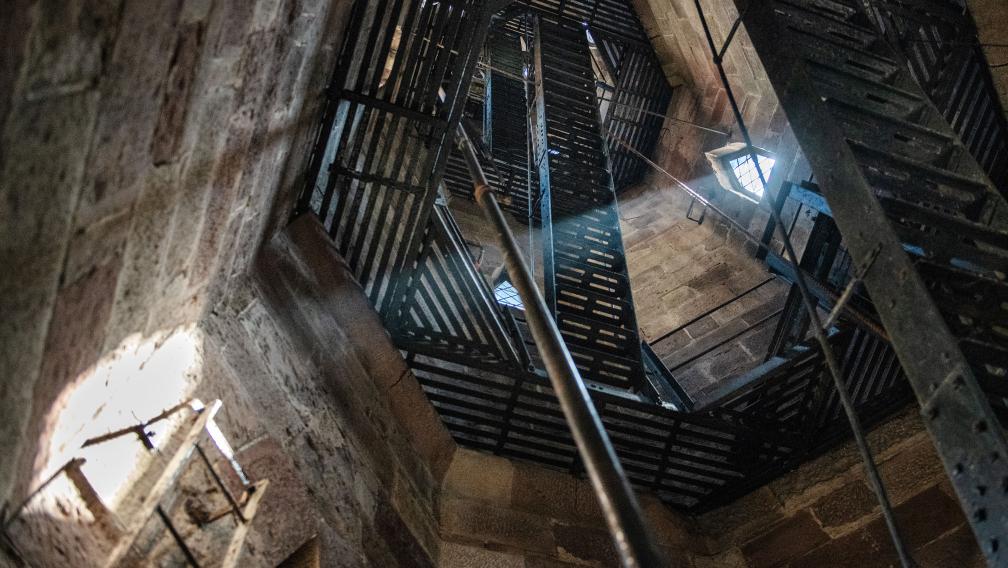Five Ways Into Sunday’s Scripture: To See and Be Seen

He entered Jericho and was passing through it. A man was there named Zacchaeus; he was a chief tax collector and was rich. He was trying to see who Jesus was, but on account of the crowd he could not, because he was short in stature. So he ran ahead and climbed a sycamore tree to see him, because he was going to pass that way. When Jesus came to the place, he looked up and said to him, “Zacchaeus, hurry and come down; for I must stay at your house today.” So he hurried down and was happy to welcome him. All who saw it began to grumble and said, “He has gone to be the guest of one who is a sinner.” Zacchaeus stood there and said to the Lord, “Look, half of my possessions, Lord, I will give to the poor; and if I have defrauded anyone of anything, I will pay back four times as much.” Then Jesus said to him, “Today salvation has come to this house, because he too is a son of Abraham. For the Son of Man came to seek out and to save the lost.”
Luke 19:1–10
In our Gospel this week, we hear the story of Zacchaeus. Those of us who experienced formal faith formation in childhood will remember this story, as it was a favorite of Sunday school teachers because they thought children could relate to Zacchaeus’s height and, of course, climbing trees.
We have come some distance in recognizing and valuing children’s capacity for deeper meaning, as well as for the abilities of those who are “vertically challenged.” Many teachers, clergy, and institutions have also evolved in their religious morality lessons, leaning toward wholeness and further from crime and punishment, toward relational compassion and away from prejudiced pity. This direction can lead us into the deeper layers of this “short story.”
One of those layers is to read this — and perhaps all of the gospel stories of Jesus’s seemingly random encounters with those who were othered by society — as stories of equal, and unexpected, exchanges of grace, of holy relationship.
Zacchaeus and Jesus changed each other. It might have been another opportunistic teaching moment for Jesus, but it isn’t written that way. The first line describes Jesus and his entourage “passing through” Jericho. And as soon as he saw Zacchaeus, he asked to stay at his house. As chief tax collector, Jesus must have known Zacchaeus’s name, occupation, and reputation. But something else must have compelled him to want to know more.
Zacchaeus, on the other hand, was used to slipping under the radar, physically and in business. He climbed the tree to see Jesus — not to be seen by anyone, much less known. And yet they are delighted and changed by seeing and being seen by one another, by each other’s grace and presence.
—Kathryn Carroll
THEOLOGY
In yet another layer under the canopy of Zacchaeus’s tree, Diana Butler Bass sees gratitude as the theme of this Gospel.
SOCIAL JUSTICE
With All Saints’ Day coming up next week, we can take a moment to consider who was historically and is presently prejudged with superficial yardsticks and cultural assumptions, which has excluded many from equal exchange of grace in God’s kin-dom. Sarah Jean Barton writes about partnering with disabled Christians to write Becoming the Baptized Body.
VISUAL ART AND MUSIC
Jesus didn’t pass by Zacchaeus, and he won’t pass us by when we humbly seek him. An old favorite in a new venue, watch the video and join the singalong with Jason Eskridge & Company: Pass Me Not, O Gentle Savior, recorded at Tokens Show in Nashville. Can you see your face in any of the faces in the audience or musicians? Can you see the presence of Jesus there?
POETRY
Our current political season and climate is not so far removed from the days and ways of Rome during the time of Zacchaeus. For all the times, a Prayer For Our Nation by Judy Chicago.
Get the Five Ways In Your Inbox
Sign up to receive reflections and updates from the Faith Formation & Education team.
Coming Soon
Sundays through November 20 | 10am
Discovery: Creation, EarthCare and Environmental Justice
The Bible has a lot to say about our interconnectedness to Creation and stewardship of the earth. Learn more in this series with Summerlee Staten, Executive Director of Trinity’s Faith Formation and Education department, Dr. Ellen Davis of Duke University Divinity School, and eco-philsopher Lyanda Haupt.
Sunday, October 23 | 1–3pm
Trinity Talks: Makoto Fujimura
Makoto Fujimura is a leading contemporary artist who creates process-driven, refractive “slow art.” Author of Art+Faith: A Theology of Making, Fujimura is an arts advocate, speaker, and theologian recognized worldwide as a cultural influencer. He will join the Rev. Phillip Jackson for a conversation about how the act of creativity helps us heal, be in relationship with one another, and build a more just world.
Sunday, October 30 | 12:30–2:30pm
Task Force Against Racism, Prison Ministry
Join Trinity’s Task Force Against Racism and Prison Ministry to plan for upcoming programs and service opportunities. Share your ideas and suggestions and contribute your thoughts as we vision the future of these important ministries. All are invited.
Sunday, October 30 | 1–3pm
Breaking Bread: A Reflective Conversation
The Breaking Bread gatherings use the imagery of table fellowship to explore reflective conversations that nurture our growth in God. Open to all. Capacity is limited; registration is required.